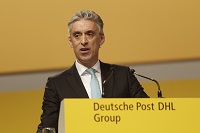Deutsche Post DHL today issued a surprise profit warning and announced restructuring measures to cut costs and counter worsening results in its underperforming core Post – eCommerce – Parcel (PeP) division.
The German mail and logistics group lowered its group EBIT guidance for this year to around €3.2 billion from the previous €4.15 billion. PeP guidance was slashed to €600 million (including a €500 million restructuring charge) compared to EBIT of €1.5 billion in 2017.
Investors reacted negatively to the news, selling off shares and sending the DP DHL share price down by as much as 9% during trading.
In a late morning statement, Deutsche Post DHL Group announced it had today decided on “a suite of measures to sustainably secure the further earnings growth” in the PeP division. The measures would counteract the division’s decline in profitability which became evident in the first quarter of 2018 and safeguard a positive earnings development in 2019 and 2020. The measures mainly target further improvement in productivity, indirect cost and yield management in the Post and Parcel business.
“We are fully focused on achieving our strategic and financial targets for 2020 and on positioning our business divisions for success in future years. In order to deliver long-term sustainable growth, we are now consciously accepting short-term negative effects on our earnings,” said Frank Appel, CEO Deutsche Post DHL Group.
The Post – eCommerce – Parcel division increased revenue by 1.7% to €4.6 billion in the first quarter of this year, including 6.3% at Parcel Germany, 9.9% at Parcel Europe and 2.6% at eCommerce but with a 1.5% decline in the Post business unit. The division’s operating profit fell by 9.9% due to higher operating costs.
DP DHL emphasised that, as communicated in the first quarter, the structural shift from Post to Parcel resulted in a number of challenges in 2018. In Parcel Germany, the division sees unchanged structural volume growth, but costs inflated with more FTEs and transport capacities needed in unusually tight labour and transport markets.
The challenge for Post is the unchanged structural volume decline with stable stamp prices since January 2016 and a high fixed cost base. Additionally, the structural shift with mail decline and parcel growth is currently not adequately reflected in the overhead cost of the division, and the investment into the further development of operations in PeP Germany has not been sufficient over the last years.
In order to address these challenges, DP DHL said it has initiated a comprehensive programme to improve productivity, reduce indirect costs and implement yield initiatives.
To increase productivity, the group “will lift PeP operations onto the next S-curve” through regular opex investments of €100 – 150 million annually. This will include automation and digitalization, continuous improvement, increased last mile productivity and intelligent network utilization. Ultimately, these operational investments will drive better customer service and higher efficiencies, which will lead to an improvement of €150 – 250 million per annum.
In order to reflect the continuous decline in letter volumes, the group will sustainably reduce the fixed cost base mainly with an early retirement program focusing on civil servants in overhead areas. This will come with restructuring costs of €500 million in 2018 and will be implemented in 2018 and 2019. The Group expects the program to lead to an annual cost reduction of at least €200 million by 2020.
In terms of yield management, for regulated products in the Post business, the group is awaiting the new regulation from the Federal Network Agency as of January 1, 2019. Price increases for unregulated larger-size shipments as of July 1 have already been announced.
In DHL Parcel Germany, the group will focus on a balance between growth and yield. Even in a competitive market, cost inflation requires price adjustments, which will be implemented on a rolling basis upon contract renewal and signing. The future volume growth for Parcel Germany is expected to be closer to the market development of 5 – 7% growth.
The measures will only help in part in 2018 when the PeP EBIT prior to one-off costs is now expected to come in at around €1.1 billion. This includes additional operating expenses for productivity improvements of around €150 million. In addition, a restructuring charge of €500 million will be recognized in 2018 to implement measures.
Starting in the second quarter of 2018 the activities of the recently founded area of Corporate Incubations will be shown as part of the new line Corporate Functions together with Corporate Center/Other. The full-year result of Corporate Incubations is expected to be €-70 million.
Including the above described effects, the management board expects in 2018 an EBIT of around €3.2 billion. The PeP division is likely to contribute at around €0.6 billion to this figure while the DHL divisions are still expected to reach around €3.0 billion. The Corporate Functions result is expected to be at €-0.42 billion, including the unchanged projection for Corporate Center/Others of a result of around €-0.35 billion.
The above mentioned measures result in a confirmed earnings forecast for 2020: Group EBIT is expected to reach more than €5.0 billion. The PeP division is expected to contribute around €1.7 billion of this and the earnings contribution of the DHL divisions is forecasted to reach around €3.7 billion. Corporate Functions is forecast to reach around €-0.35 billion.










